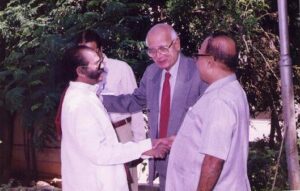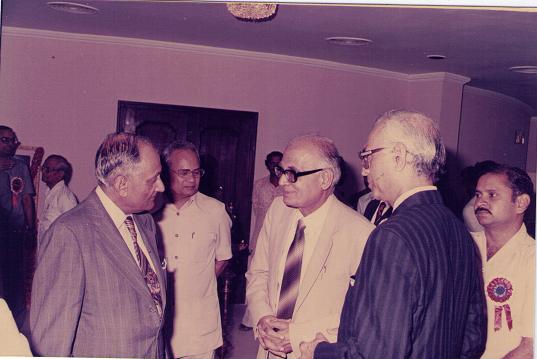(……Continued) Our’s was an open house, hospitable and giving shelter to the needy. As it was strategically located some friends coming from Hyderabad by train would stop for the night and proceed to their place next morning. They would have a meal prepared by my mother, but served by us children on plantain or in a plate of stitched leaves, which became dry. Sometimes on official work they would stay for a couple of days, taking our hospitality.
There were other kinds of people who were entertained in the annexe to our house. From Punjab came Nanak Chand and Jeevan Das with a load of woolen blankets, sweaters and the like. They camped during the season making big and fat chappaties selling their ware during the day and were back in the night. Father bought from them what we required at a concessional rate, before they left. Then there was a couple, who would stay for months on end for medical treatment, who were like family members but would have their own cooking etc. – Cholleti Raghava Reddy and his wife Manikyamma, whose grand son-in-law Sashi is a pranic healer (brother-in-law of K.V. Raghunatha Reddy, Ex Union Minister) in Hyderabad. As a lad I would spend time with them watching Reddy write in green ink in close lines Rama Koti (Rama’s name – Sri Rama Jaya Rama Jaya Jaya Rama a crore of times) which he later offered to Lord Rama in the temple at Bhadrachalam. He used to get an Urdu paper which I would read. I read the autobiography of Jawaharlal Nehru for the first time in Urdu, a copy of which Reddy had. He and my father were like brothers with moustache (which he dyed; my father didn’t) and the way they dressed their hair. Father had acute head ache. So he shaved hair on the head in the middle rectangularly with hair intact on the right and left side so that when a cap is worn the gap will not be detected. He used to apply almond oil on the head and if available mother’s milk dipped in cotton wool. Surprisingly Reddy imitated his hair-do though he didn’t have head ache, such was their consanguinity. Years later, when he contracted tuberculosis and came to Hyderabad, my eldest brother whom he had helped in learning swimming and horse riding in his village for his appearing for Civil Service examination, had him as guest for sometime even against friendly advice by his father-in-law, not to do so for fear of infection.
My father who at times used to visit his friend Nataraj in the vicinity of our house brought the news one day that Second World War broke out (September 2 1939 midnight) and Danzig in Poland fell within half an hour of the attack by Hitler’s Germany. I watched the course of the War, conquest by Hitler of Benelux countries (Belgium, Holland and Luxenburg), Denmark, Norway, France which all fell like a pack of cards. German bombers gave sleepless nights to Londoners. Britain declared War on Germany, also on behalf of India. Indian Army was very much in evidence in the War, with Axis powers, Germany and Italy on one side and Britain and other countries forming Allies. America was on the fence and jumped into the battlefield head and shoulders after Japan attacked Phillipines. Though we were aware that Hitler was a merciless dictator setting up concentration camps, people here had some admiration for him, because of his Aryan professions with Hindus’ sacred Swastika as his emblem and being enemy’s (British) enemy.

India stood up to shoulder efforts with British Government, which pressed the Viceroy to go all out not only to rush help with men and money but suppress the national movement for liberation of India raising its head in myriad ways. It climaxed in the “Quit India” call given by Gandhiji on August 9, 1942, resulting in the arrest of thousands of people led by Gandhiji himself.
The call of revolt to the British rule were felt, though feebly in the Princely Hyderabad State whose Nizam gave massive support to the British in their war effort for which he got the title of His Exalted Highness, the Nizam of Hyderabad and Berar as against other princes being only called His Highness.
Coming to my own story, I was told that my mundan (puttu ventrakulu—shaving the head) was done when I was 3 in Tirupathi and then my Upanayanam (thread ceremony) at 7, also on the Tirumala Hills coinciding with my eldest brother’s marriage. His father-in-law a Maharashtrian Brahmin Jairam Rao Deshmukh practicing law in Asifabad had told my father working in Collector’s office there, when my sister-in-law was born that he would give her in marriage to my brother who was then 7. He kept his word. See how marriages were arranged then. I remember my travel by train to Tirupathi in the then third class compartment which wended its way slowly but in a stately way. The memories are desultory. I remember having gone up the hill in a ‘doli’ carried by well built men with probably my mother with me. The rest is blank. My marriage too was held in Tirupathi this time, our car going straight to the Hills on the well constructed ghat road.
My mother belonged to Yelgandal, near Karimnagar, then called Sarkar Yelgandal, a district headquarters. It had a fort which I saw when I went there after my maternal grand father’s death. To go to my grandfather’s place my father borrowed a car from a friend (a Zamindar, Gundavaram Jagannadha Rao whose son-in-law J.V. Narsing Rao later became Deputy Chief Minister of Andhra Pradesh) an Austin car with canvas cloth as roof with a well-groomed Sikh driver Arjun Singh. While father remained at Hanamkonda, he sent my mother and children for attending grandfather’s tenth day ceremony. He wouldn’t like my mother to go by bus! Even otherwise, my mother would be sent only in a tonga (horse-driven carriage) with a curtain on when she visited any place in town. It was a sign of Muslim purdah influence. Her family was of priestly order. My grandfather Hanumaiah, handsome, a Vedic scholar and an astrologer died at the age of 90. When my eldest brother after getting disappointed for not being selected in the Civil Service examination had gone away to far remote North, my mother was worried about his future and life. She asked her father about him. He answered nothing would happen to him and he would live till 90. It exactly happened. My brother passed away in 2005 at the age of 90. The prediction came true to the hilt. My mother did not know even alphabets and would sign with thumb impression to take her paltry pension of Rs.3/- which later was increased by adding DA. The superstition then was that if girls were given schooling, brothers won’t learn. So they broke her slate, she used to tell us. She regretted all her life about not pursuing studies. Yet, she was shrewd and knew political developments like Razakar atrocities, Police Action, a woman Indira Gandhi becoming Prime Minister. She lived till 80 and died in 1976 on Vijaya Dasami (Dasara) day. Once she answered questions about politics, good government etc. put by inquisitive granddaughters Malathi (my daughter) and Meena (my niece) to test her, which was recorded.
We first lived in a lady teacher’s house, Rangamma Pantulamma in Chowrastha (where four roads meet), as tenants in Hanamkonda. I was 14 years younger than my eldest brother, Kishan Rao. Rangamma Pantulamma’s daughter Kamalamma was a pretty girl. There were other tenants too, R.V. Rao with whose small daughter, Kamala I used to converse. I don’t know who told her: She would say: “I will marry only Vaman”!
My father had qualities of leadership. He was bold, forthright and helpful, eager to bail out any one in trouble. In those days there were fears of dacoits. Father would keep vigil armed with Jambia (short sword) a stick and a torch light, doing rounds along with a couple of trusted friends in the locality. While he had always a streak of independence in dealing with men and matters, he was cordial to people and maintained good relations with friends. His image was one of respectability, giving wise counsel. Therefore, they all looked to him when in trouble, domestic or business or official. He was a no nonsense person. He would not hesitate to thrash Holi revelers who barged into our house chanting in vulgar language. (to be concluded)







